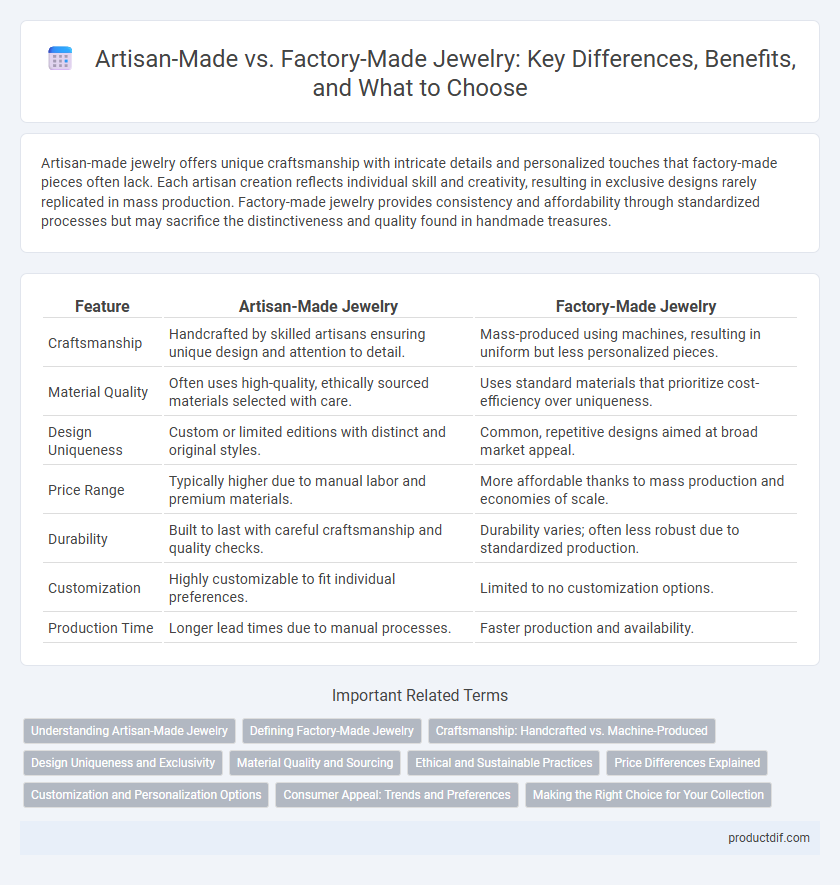Artisan-made jewelry offers unique craftsmanship with intricate details and personalized touches that factory-made pieces often lack. Each artisan creation reflects individual skill and creativity, resulting in exclusive designs rarely replicated in mass production. Factory-made jewelry provides consistency and affordability through standardized processes but may sacrifice the distinctiveness and quality found in handmade treasures.
Table of Comparison
| Feature | Artisan-Made Jewelry | Factory-Made Jewelry |
|---|---|---|
| Craftsmanship | Handcrafted by skilled artisans ensuring unique design and attention to detail. | Mass-produced using machines, resulting in uniform but less personalized pieces. |
| Material Quality | Often uses high-quality, ethically sourced materials selected with care. | Uses standard materials that prioritize cost-efficiency over uniqueness. |
| Design Uniqueness | Custom or limited editions with distinct and original styles. | Common, repetitive designs aimed at broad market appeal. |
| Price Range | Typically higher due to manual labor and premium materials. | More affordable thanks to mass production and economies of scale. |
| Durability | Built to last with careful craftsmanship and quality checks. | Durability varies; often less robust due to standardized production. |
| Customization | Highly customizable to fit individual preferences. | Limited to no customization options. |
| Production Time | Longer lead times due to manual processes. | Faster production and availability. |
Understanding Artisan-Made Jewelry
Artisan-made jewelry showcases unique craftsmanship with each piece meticulously handcrafted by skilled artisans, emphasizing individuality and high-quality materials. Unlike factory-made jewelry, which often prioritizes mass production and uniformity, artisan creations reflect cultural heritage and personal expression through intricate designs. This distinction highlights the greater value and exclusivity associated with artisan-made jewelry in the luxury market.
Defining Factory-Made Jewelry
Factory-made jewelry is mass-produced using automated machinery and standardized processes to ensure uniformity and high volume output. This type of jewelry often employs materials like synthetic stones and plated metals to reduce costs, making it more affordable but less unique compared to artisan-made pieces. Precision and consistency characterize factory-made designs, catering to widespread market demand rather than individual craftsmanship.
Craftsmanship: Handcrafted vs. Machine-Produced
Artisan-made jewelry showcases exceptional craftsmanship through meticulous handcrafting techniques that ensure unique details and superior quality. Each piece reflects the artisan's skills, creativity, and attention to fine elements, resulting in one-of-a-kind designs often impossible to replicate by machines. In contrast, factory-made jewelry benefits from machine production's efficiency and consistency but typically lacks the personalized intricacies and distinctive character found in handcrafted creations.
Design Uniqueness and Exclusivity
Artisan-made jewelry showcases unparalleled design uniqueness, with each piece reflecting the individual craftsmanship and creativity of the maker, resulting in exclusive, one-of-a-kind items often unavailable in mass-produced collections. Factory-made jewelry prioritizes uniformity and scalability, producing designs that cater to broad market appeal but lack the personalized intricacies and exclusivity found in artisan creations. Collectors and connoisseurs seeking distinctiveness and originality frequently gravitate towards artisan-made pieces for their rarity and artistic value.
Material Quality and Sourcing
Artisan-made jewelry often features superior material quality due to careful handpicking of ethically sourced gemstones and metals, ensuring authenticity and durability. Factory-made pieces typically rely on mass-produced materials that may include lower-grade metals and synthetic stones to reduce costs. Prioritizing artisanal craftsmanship guarantees unique designs and responsibly sourced, high-quality materials that enhance both aesthetic appeal and longevity.
Ethical and Sustainable Practices
Artisan-made jewelry often emphasizes ethical sourcing and sustainable practices by utilizing locally sourced materials and traditional techniques that minimize environmental impact. Factory-made jewelry can contribute to higher carbon footprints and unethical labor conditions due to mass production and less transparency in the supply chain. Prioritizing artisan craftsmanship supports fair wages, reduced waste, and eco-friendly production methods that align with sustainable fashion values.
Price Differences Explained
Artisan-made jewelry typically commands higher prices due to the use of unique craftsmanship, premium materials, and time-intensive techniques, resulting in one-of-a-kind pieces that reflect artistic individuality. Factory-made jewelry benefits from mass production efficiencies, reducing costs and allowing lower retail prices but often lacks the personalized detail found in handmade items. Consumers weigh the value of exclusivity and craftsmanship against affordability when comparing artisan-made versus factory-made jewelry pricing.
Customization and Personalization Options
Artisan-made jewelry offers extensive customization and personalization options, allowing clients to collaborate closely with skilled artists to create unique, tailored pieces reflecting personal stories or preferences. Factory-made jewelry often features limited customization, primarily focusing on standardized designs with minimal modifications such as engraving or choice of metal finishes. The artisan approach emphasizes bespoke craftsmanship and individuality, while factory production prioritizes scalability and uniformity.
Consumer Appeal: Trends and Preferences
Artisan-made jewelry attracts consumers seeking unique, handcrafted pieces that showcase individuality and craftsmanship, driven by a growing trend toward sustainable and ethical fashion. Factory-made jewelry appeals through affordability, consistency, and mass availability, aligning with consumers prioritizing convenience and budget-friendly options. Current preferences highlight a rising demand for artisan creations, fueled by social media influencers and a shift toward personalized, eco-conscious shopping experiences.
Making the Right Choice for Your Collection
Artisan-made jewelry offers unique craftsmanship, often incorporating intricate details and personalized designs, making each piece one-of-a-kind and ideal for collectors seeking exclusivity. Factory-made jewelry provides consistent quality and affordability due to mass production, appealing to those prioritizing budget and uniformity. Selecting either artisan or factory-made pieces depends on whether you value singular artistic expression or cost-effective, standardized designs for your collection.
Artisan-made vs Factory-made Infographic

 productdif.com
productdif.com